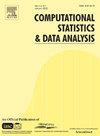时空条件泊松点过程的变量选择
IF 1.6
3区 数学
Q3 COMPUTER SCIENCE, INTERDISCIPLINARY APPLICATIONS
引用次数: 0
摘要
时空点模式数据在许多科学学科中越来越流行。我们考虑一个空间点过程序列,其中每个点过程都是给定过去的泊松过程。我们将每个点过程的条件一阶强度函数建模为空间、时间和时空协变量的参数对数线性函数,这些协变量可能依赖于先前的点模式。与纯粹的空间情况相比,处理时空协变量带来了计算和方法上的挑战。我们扩展了空间点过程变量选择的正则化方法,以在考虑的时空情况下获得简洁和可解释的模型。使用我们提出的方法,我们进行了两次模拟研究,并检查了波哥大肯尼迪区犯罪活动的应用。在应用程序中,我们考虑了犯罪地点的时空点模式数据以及与城市地点、环境因素和进一步的时空因素相关的一些空间、时间和时空协变量。考虑其他犯罪作为协变量信息,估计了车辆盗窃的强度函数。所提出的方法提供了一种全面的方法来分析时空点模式犯罪数据,捕捉协变量和犯罪事件之间的复杂关系。本文章由计算机程序翻译,如有差异,请以英文原文为准。
Variable selection for spatio-temporal conditionally Poisson point processes
Spatio-temporal point pattern data are becoming prevalent in many scientific disciplines. We consider a sequence of spatial point processes where each point process is Poisson given the past. We model the conditional first-order intensity function of each point process as a parametric log-linear function of spatial, temporal, and spatio-temporal covariates that may depend on previous point patterns. Dealing with spatio-temporal covariates brings computational and methodological challenges compared to the purely spatial case. We extend regularisation methods for spatial point process variable selection to obtain parsimonious and interpretable models in the considered spatio-temporal case. Using our proposed methodology, we conduct two simulation studies and examine an application to criminal activity in the Kennedy district of Bogota. In the application, we consider a spatio-temporal point pattern data of crime locations and a number of spatial, temporal, and spatio-temporal covariates related to urban places, environmental factors, and further space-time factors. The intensity function of vehicle thefts is estimated, considering other crimes as covariate information. The proposed methodology offers a comprehensive approach for analysing spatio-temporal point pattern crime data, capturing complex relationships between covariates and crime occurrences over space and time.
求助全文
通过发布文献求助,成功后即可免费获取论文全文。
去求助
来源期刊

Computational Statistics & Data Analysis
数学-计算机:跨学科应用
CiteScore
3.70
自引率
5.60%
发文量
167
审稿时长
60 days
期刊介绍:
Computational Statistics and Data Analysis (CSDA), an Official Publication of the network Computational and Methodological Statistics (CMStatistics) and of the International Association for Statistical Computing (IASC), is an international journal dedicated to the dissemination of methodological research and applications in the areas of computational statistics and data analysis. The journal consists of four refereed sections which are divided into the following subject areas:
I) Computational Statistics - Manuscripts dealing with: 1) the explicit impact of computers on statistical methodology (e.g., Bayesian computing, bioinformatics,computer graphics, computer intensive inferential methods, data exploration, data mining, expert systems, heuristics, knowledge based systems, machine learning, neural networks, numerical and optimization methods, parallel computing, statistical databases, statistical systems), and 2) the development, evaluation and validation of statistical software and algorithms. Software and algorithms can be submitted with manuscripts and will be stored together with the online article.
II) Statistical Methodology for Data Analysis - Manuscripts dealing with novel and original data analytical strategies and methodologies applied in biostatistics (design and analytic methods for clinical trials, epidemiological studies, statistical genetics, or genetic/environmental interactions), chemometrics, classification, data exploration, density estimation, design of experiments, environmetrics, education, image analysis, marketing, model free data exploration, pattern recognition, psychometrics, statistical physics, image processing, robust procedures.
[...]
III) Special Applications - [...]
IV) Annals of Statistical Data Science [...]
 求助内容:
求助内容: 应助结果提醒方式:
应助结果提醒方式:


